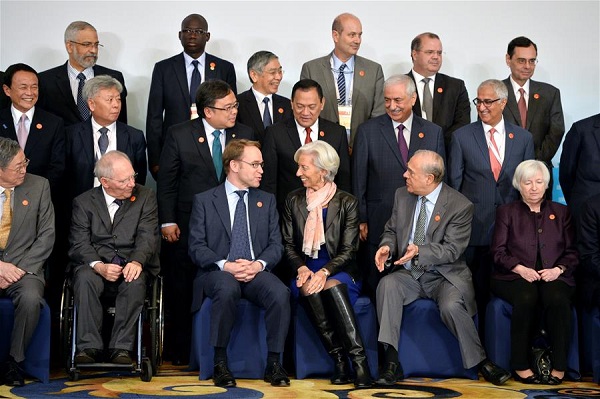
The G20 nations on Saturday pledged to use all policy tools, including monetary, fiscal and structural ones to strengthen global recovery that has remained uneven.
“The global recovery continues, but it remains uneven and falls short of our ambition for strong, sustainable and balance growth,” noted a communique issued after the two-day G20 Finance Ministers and Central Bank Governors Meeting in Shanghai.
China on Friday urged faster progress in structural reforms.
China’s Finance Minister Lou Jiwei stressed on removal of trade barriers and “more encouragement for companies to invest”.
The G20 policymakers cited volatile capital flows, slumping commodity prices, escalated geopolitical tensions, a potential UK exit from the European Union and increasing refugees as major vulnerabilities of the global economy.
To foster confidence, monetary policies will continue to support economic activity and ensure price stability, but monetary tools alone cannot lead to balanced growth, said the communique.
“We will use fiscal policy flexibly to strengthen growth, job creation and confidence,” it added.
China is currently holding the chair of the G20, which is a grouping of 20 developed and developing nations.
All the five BRICS countries are members of G20.
The group reaffirmed their previous exchange rate commitments, including refraining from competitive devaluations and not targeting exchange rates for competitive purposes.
“We will carefully calibrate and clearly communicate our macroeconomic and structural policy actions to reduce uncertainty, minimize negative spillovers and promote transparency,” the communique pledged.
The G20 meet came amid weak economic growth worldwide and increasing volatility in the financial markets. The IMF earlier this week highlighted increasing risks to global recovery and called for urgent and bold action to support growth.
In January, it forecast the global economy to grow 3.4 per cent this year and 3.6 per cent next year, both 0.2 percentage points lower than its forecast in last October. The fund also said it may further downgrade the figure when it publishes its next forecast in April.
The G20 communique, however, did not outline any plan for specific coordinated stimulus spending to spark activity.
Chinese policymakers sketched out the country’s economic policies and reform agenda, reassuring the world that the government has plenty policy tools to combat downward pressure as financial leaders from G20 nations held talks in Shanghai.
“The Chinese economy has great potential, resilience and flexibility, and we will capitalize on such strengths,” Chinese Premier Li Keqiang said in a video message to the G20 Finance Ministers and Central Bank Governors Meeting.
Indian Finance Minister Arun Jaitley skipped the G20 meet owing to the budget session of the Indian parliament. Indian Central Bank Governor Raghuram Rajan participated in the talks in Shanghai.
Global ratings agency Moody’s Investors Service estimates India’s economic growth at 7.5 per cent in both 2016 and 2017, as it expects actions by policymakers to lift the country’s economic growth.
“India is relatively less exposed to external factors, including China slowdown and global capital flows. Instead, the economic outlook will be primarily determined by domestic factors,” a new report said.
The G20 Summit, in which Prime Ministers and heads of states of these countries will participate, will be held at Hangzhou on September 4-5.